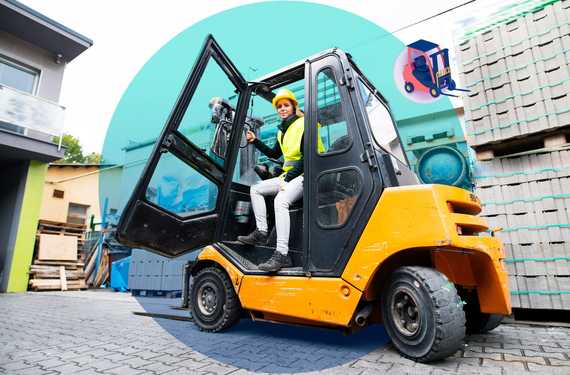

PPE for temporary workers.
16 October 2023 · 3 min reading time
Join Staffmatch
See job offersDepending on your sector of activity, the use of personal protective equipment (PPE) may be mandatory. Designed to protect your safety in the workplace, PPE is essential for the safe completion of certain tasks.
What kind of equipment are they, and who provides them? Staffmatch explains.
PPE: Definition
PPE is the acronym for Personal Protective Equipment. PPE refers to all accessories and tools necessary to guarantee the safety and health of a worker. They protect against auditory, mechanical, electrical, biological, and chemical risks.
This can include protective gloves, goggles, or a helmet, for example. A connection system that allows PPE to be attached to a complementary external device is also considered PPE (e.g., harnesses and ropes).
Any necessary PPE must be mentioned in your employment contract.
☝️Good to know: The employer must train the temporary worker on its use and ensure that the worker knows how to use the accessory or how to wear it, in order to ensure their protection.
⚖️ Personal protective equipment (...) means any device or means intended to be worn or held by a person at work and which protects the person against one or more risks to their health or safety. Source: French Labor Code, article R4311-8
The temporary worker must wear the equipment in accordance with its intended use. Wearing it is mandatory for the required duration to complete their assignment safely.
🚀 The use of PPE is very common for jobs in the construction, industry, and logistics sectors.
Categories of PPE
Regulated by the French Labor Code, PPE is classified into different categories, depending on the severity of the risks associated with the job.
The three categories of protection against risks are:🥽 Category I - Minor Risk:Category I PPE aims to protect employees against superficial injuries that do not endanger their lives. This includes safety shoes and glasses or gardening gloves.🦺 Category II - Major Risk:Category II PPE guarantees the health and safety of workers against serious injuries that can affect vital parts of the body. This includes safety vests, protective visors, or helmets.☠️ Category III - Fatal Risk:The third category concerns risks of fatal danger that can threaten the worker's life or cause irreversible injuries. This includes harnesses, carabiners, and respiratory masks against toxic products, for example.
☝️Good to know: PPE is not part of your remuneration; it is not a benefit in kind.
❗ If you believe that your work situation is dangerous and puts your safety at risk, you must alert your supervisor and your temporary employment agency. You also have the right to alert and withdraw.
⚖️ The worker shall immediately alert the employer of any work situation which they have reasonable grounds to believe presents a serious and imminent danger to their life or health, as well as any defect they observe in the protection systems. They may withdraw from such a situation. The employer may not ask a worker who has exercised their right to withdraw to resume their activity in a work situation where a serious and imminent danger persists, resulting in particular from a defect in the protection system. Source: French Labor Code, article L4131-1
Temporary Worker, Temporary Employment Agency (ETT), or User Company: Who Provides PPE?
The law is very clear on the subject: it is the employer who must provide PPE to the employee free of charge. Thus, in temporary employment, it is a special case, since the temporary worker's employer is the ETT and not the user company.
⚖️ Personal protective equipment and work clothes (...) shall be provided free of charge by the employer, who shall ensure their proper functioning and maintenance in a satisfactory hygienic condition through the necessary maintenance, repairs, and replacements. Source: French Labor Code, article R4323-95In this case, to whom is the responsibility for providing PPE to temporary workers referred? The French Labor Code explicitly answers the question. It is the user company that must provide PPE free of charge to all its employees, including temporary workers. Thus, in accordance with article L1251-23 of the French Labor Code, "certain personalized personal protective equipment, defined by collective agreement or agreement, may be provided by the temporary employment agency."
🚀 For Category I PPE (minor risk), Staffmatch can provide you with the necessary equipment. For any questions and information, please contact your recruiter or call us at 0188243500!
☝️Good to know: Depending on who provides you with the PPE, the user company or your ETT has the obligation to maintain, repair, replace, and regularly check their proper functioning. Any lack of conformity may result in legal sanctions.
Training to Maximize Workplace Safety
In addition to the provision of PPE, companies and workers, including temporary workers, must also consider specific training to maximize safety in the workplace. For example, in the construction sector, operating heavy machinery is a common task. The CACES (Certificate of Aptitude to Safely Operate Equipment) is an example of essential training for operators of this equipment. It certifies that workers are competent and able to handle this equipment safely.
PPE is a key element of safety, which, when complemented by adequate training, minimizes risks. Workers who master both PPE and the skills related to their sector are better prepared to face the challenges and potential hazards in the workplace.
Similar articles

Advice
What is the CACES and how to obtain it?
07 March 2025 · 4 min reading time
Discover everything about the CACES: its usefulness, categories, conditions for obtaining it, and financing options. A complete guide for success in 2024.

Advice
Jobs in transport and logistics
19 March 2023 · 5 min reading time
Key sectors in the economy, transport and logistics account for more than two million jobs in the French labor market each year.

Advice
Temporary construction jobs
03 April 2023 · 4 min reading time
The construction industry (BTP - Bâtiment et Travaux Publics) was one of the sectors that recruited the most in 2022, and the situation is not expected to change in 2023. But what is it, and what jobs can you do?
Become a temp worker with Staffmatch!

OUR MOBILE APPS Download the temp worker app
Download the temp worker app Download the business app
Download the business app Download our temp worker app
Download our temp worker app Download our business app
Download our business app
